WASHINGTON, D.C. -- After hitting a low point at the end of President Barack Obama's first term, U.S. leadership ratings worldwide rallied in 2013 as he began his second. Median approval of U.S. leadership across 130 countries stood at 46% last year, up from Obama's first administration low of 41% in 2012.
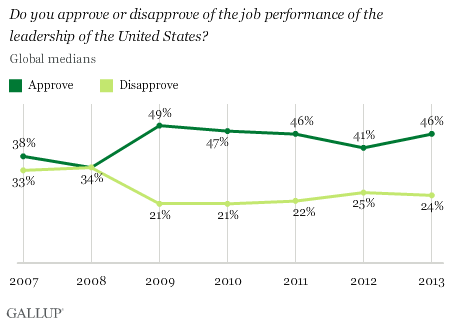
While this was not a full recovery to the 49% approval attained at the start of Obama's presidency, it ended a downward trend.
U.S. leadership -- which for most of the world likely means Obama -- earned a higher global approval rating during a challenging year in U.S. foreign relations. It had its share of diplomatic gains in 2013: The U.S. and other countries worked to engage Iran, and long-isolated Myanmar continued to open its doors. But there were more than a few setbacks. U.S.-Russian relations fell apart over the Edward Snowden affair and Syria, and residents in Germany and other countries were outraged over the U.S. National Security Agency's spying program.
Approval Reaches High in Asia
While the U.S. government shutdown in October kept the president from making his trip to Asia in late 2013, the image of U.S. leadership may be benefiting from the administration's attempts to strengthen its alliances and trade partnerships throughout the Asia-Pacific region. In fact, the 45% median approval rating in Asia is the highest Gallup has measured in the region during either the Obama or the Bush administrations.
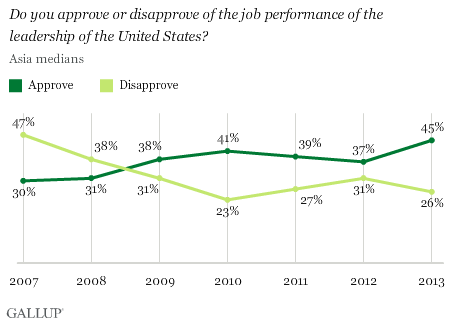
Rather than stemming from large, sweeping improvements, this change is chiefly attributable to ratings generally increasing in more countries than they declined in. However, four out of the 17 countries worldwide where approval ratings saw double-digit increases in 2013 were in Asia: Afghanistan, Bangladesh, Myanmar, and Pakistan.
Ratings still vary considerably across the region, but for the most part, they tend to be more positive than negative. Countries in the Middle East and parts of South Asia, where residents were still more likely to disapprove than approve, continue to be the exception.
U.S. Image Recovering in Europe Before Spying Allegations
Europe led declines in U.S. approval in 2012 as America likely shouldered some of the blame for the financial crisis there, but leadership ratings started to improve as Europe began its recovery in 2013. A median of 41% approved of U.S. leadership last year, up from 36% in 2012. However, it is important to note that surveys in Europe were largely complete in the first part of 2013. Ratings likely do not reflect any of the public outrage after allegations surfaced last fall that the U.S. was monitoring the phone calls of world leaders, including German Chancellor Angela Merkel.
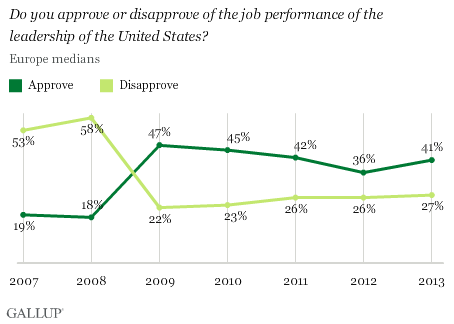
While losses in approval outnumbered gains in 2012, the reverse was true in 2013. The U.S. retained majority support in 10 countries in 2013 that spanned all regions of Europe and included key allies such as Italy, Ireland, Denmark, and the United Kingdom. Of the 17 countries where there were double-digit increases in approval ratings, half were in Europe, with many of them clustering in southern and eastern Europe.
However, U.S. leadership failed to regain favor in countries such as France, Spain, and Germany, where approval first fell below the majority level in 2011 and stayed there. The Snowden affair likely did not help the U.S. image in these countries, and Obama will need to try to hit a reset as they tackle issues from the proposed transatlantic trade deal to Iran to the crisis in Ukraine.
Leadership Ratings Largely Stable in the Americas
U.S. leadership approval ratings in the Americas started tumbling after Obama's first year in office, along with many Latin Americans' expectations for stronger ties between the U.S. and the region. The free fall ended in Obama's fourth year, and in his fifth, approval ratings in the region remained stagnant. However, there were double-digit increases in approval in four countries -- including in neighboring Mexico -- and a double-digit decrease in Colombia.
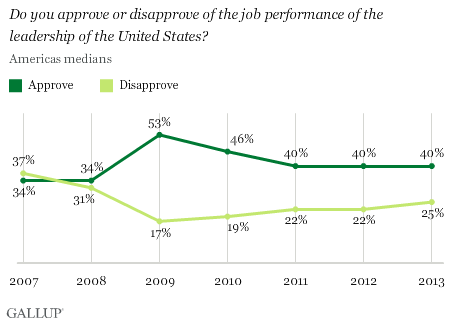
Goodwill toward U.S. leadership continued to build in Mexico in 2013, likely further buoyed by the president's visit there in May. Fifty percent of Mexico residents approved of U.S. leadership, representing a 13-percentage-point jump from 37% in 2012, on top of an 11-point increase from 26% in 2011. Current ratings are approaching the 53% approval during Obama's first term.
Although Colombian President Juan Manuel Santos said U.S.-Colombian relations are "at their best moment ever" during his meetings with Obama in December 2013, many Colombians do not agree. Just 36% of Colombians approved of U.S. leadership at the time of their president's visit to the U.S., down 11 points from 47% in 2012.
Image Strong in Africa, but Gains Gone
The image of U.S. leadership continued to be the strongest worldwide in Africa in 2013, bolstered by strong majority approval in most of the sub-Saharan Africa region. However, approval ratings continued to erode in 2013, essentially negating any gains in the region even prior to Obama's election. Given Obama's Kenyan heritage, many Africans likely expected Obama to pay more attention to Africa than they perceive he has.
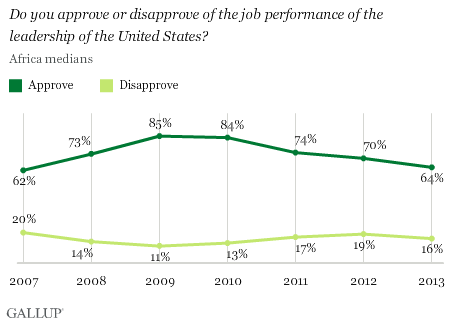
Nearly all of the countries where there were double-digit losses in U.S. approval ratings in 2013 were in Africa. Madagascar and Angola led the world in declines, with ratings dropping by 23 and 20 points, respectively. Even in South Africa, which Obama visited twice in 2013, the rating dropped 16 points. However, since ratings were high to begin with in Angola and South Africa, majorities still approved of U.S. leadership.
U.S. leadership remains far less popular in North Africa than it is south of the Sahara. In the three North African countries that Gallup could safely survey in 2013 -- Morocco, Tunisia, and Egypt -- fewer than one in four residents approved. Ratings remained flat and low in Egypt at 16%; however, data were collected prior to President Mohamed Morsi's ouster in July and cuts in U.S. aid later that year, so it is possible approval is now even lower.
Implications
Although the image of the leadership of the U.S. showed signs of rebounding in 2013, the U.S. will continue to face more challenges in 2014 and beyond. Chief among them in the near term will be how the U.S. and its NATO partners respond to Russia and the United States' ongoing pursuit of a "rebalancing" with Asia. These challenges make the strength of U.S. alliances and partnerships -- and the soft power of what the world thinks of the U.S. -- more important than ever.
Read the complete findings from the U.S.-Global Leadership Project.
For complete data sets or custom research from the more than 150 countries Gallup continually surveys, please contact us.
Survey Methods
Results are based on face-to-face and telephone interviews with approximately 1,000 adults, aged 15 and older, conducted throughout 2012 in 130 countries and 2013 in 130 countries. For results based on the total samples margin of sampling error ranges from ±1.7 percentage points to ±5.0 percentage points at the 95% confidence level. The margin of error reflects the influence of data weighting. In addition to sampling error, question wording and practical difficulties in conducting surveys can introduce error or bias into the findings of public opinion polls.
With some exceptions, all samples are probability based and nationally representative of the resident population aged 15 and older.
Exceptions include areas where the safety of interviewing staff is threatened, scarcely populated islands in some countries, and areas that interviewers can reach only by foot, animal, or small boat.
For more complete methodology and specific survey dates, please review Gallup's Country Data Set details.
